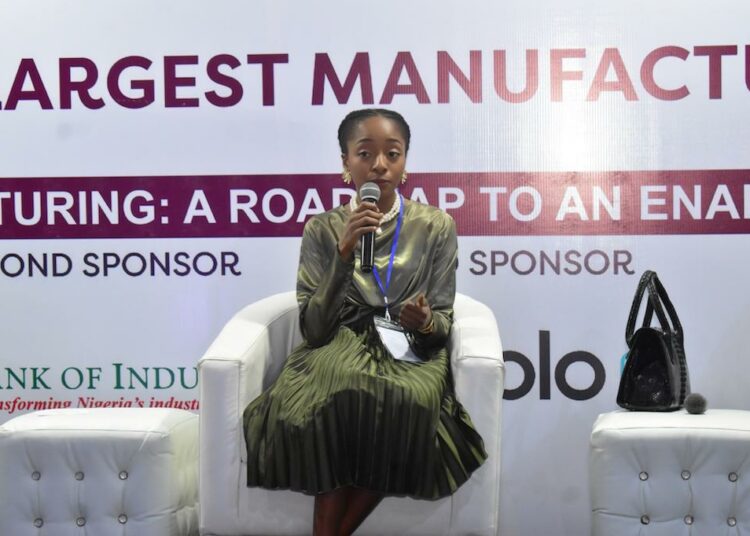Seasoned professional, Eme Bassey, has buttressed the need to address the gender disparity gaps in the fashion industry at the Nigeria Manufacturing and Equipment Expo, noting that the strenuous working hours typically required in apprenticeship programmes make it tough and challenging for women to balance work hours with family commitments, ultimately
widening the skill gap over time.
She highlighted the systemic obstacles, wage gap differences and gender disparity issues that distort the fashion and manufacturing industry sector in Nigeria while urging women to surpass expectations and drive more inclusion.
Eme, with over five years experience in apparel manufacturing, represented the Centre for African Fashion Education and Technology (CAFET) as a panelist at the Nigeria Manufacturing and Equipment Expo which was held at the Federal Palace Hotel in Victoria Island on November 21– 23, 2023.
Eme played a pivotal role in the conversation on “Dismantling the Barriers to Women in Manufacturing”, by shedding light on the systemic obstacles faced by women entering the fashion industry and proposing actionable solutions.
Speaking during the panel discussion, Eme Bassey delved into the prevailing trends in the fashion industry that perpetuates the wage gap between men and women.
She highlighted the fact that women’s journeys into the industry are often shaped by circumstance, rather than
intention, either due to societal biases or financial constraints that hinder them from pursuing formal education.
Consequently, women tend to acquire skills at the bottom of the value
chain, contributing to a persistent disparity. She emphasized that men are more likely to choose fashion as a career, thus benefiting from better-quality training, positioning them above their female counterparts.
Moreover, she drew attention to the extended and strenuous working hours typically required in apprenticeships, making it challenging for women to balance family commitments, ultimately
widening the skill gap over time.
Eme Bassey shone the spotlight on targeted programs that could address work-life balance challenges faced by women in manufacturing. She praised on-site childcare facilities as a
commendable initiative fostering a family-friendly workplace while improving productivity.
Additionally, she advocated for flexible work arrangements, recognizing the importance of accommodating pregnant and nursing mothers to maintain a balance between career and
family responsibilities.
As a partnerships professional, Eme underscored the crucial role industry associations and networks play in supporting and empowering women in manufacturing. She highlighted the
significance of support groups and collectives as pressure points to advance the interests of
women in the sector.
She also recommended mentoring and continued education as key
tools to help women enhance their skills and confidence, resulting in better quality outputs.
Eme Bassey concluded her insightful discussion by encouraging women to be audacious and demand more for themselves. She pointed out the perfectionism syndrome that often
plagues women and impedes their progress.
Eme urged women not to wait until they have surpassed expectations before reaching out for opportunities, requesting promotions, and demanding the recognition they deserve.
Eme’s participation in the Nigeria Manufacturing and Equipment Expo provided a valuable platform to address gender disparities in manufacturing, with insights from the fashion industry, offering practical solutions for a more inclusive and equitable future.











